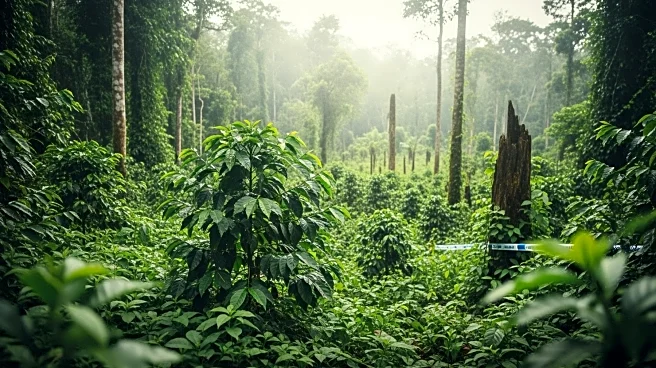What's Happening?
A report by the nonprofit group Coffee Watch highlights the impact of coffee-driven deforestation in Brazil, the world's largest coffee producer. The report reveals that over 1,200 square miles of forest have
been cleared for coffee cultivation between 2001 and 2023. This deforestation disrupts the natural water cycle, leading to reduced rainfall and increased drought conditions, which in turn make coffee cultivation more challenging. While cattle ranching remains the primary cause of deforestation in Brazil, the role of coffee farming is significant and often overlooked. The report calls for more sustainable coffee-growing practices to mitigate these environmental impacts.
Why It's Important?
The findings underscore the complex relationship between agricultural practices and environmental sustainability. As global demand for coffee continues to rise, the pressure on land resources intensifies, leading to environmental degradation. This situation poses a threat not only to biodiversity and climate stability but also to the long-term viability of coffee production itself. The report suggests that coffee consumers and businesses need to be more aware of the environmental costs of coffee production and support sustainable practices to ensure the industry's future.
What's Next?
The report urges coffee businesses to avoid sourcing coffee from deforested lands and encourages the adoption of sustainable agroforestry practices. These include using shade trees and diversifying crops, which can help maintain ecological balance. The Brazilian government, under President Luiz Inácio Lula da Silva, has made progress in combating deforestation, but further efforts are needed. The report also calls on consumers to consider the environmental impact of their coffee purchases and support brands that prioritize sustainability.
Beyond the Headlines
The issue of coffee-driven deforestation highlights broader ethical and environmental challenges in global supply chains. It raises questions about the responsibility of consumers and corporations in promoting sustainable practices. The report suggests that a shift in consumer awareness and behavior could drive demand for more environmentally friendly products, potentially leading to systemic changes in the industry.










